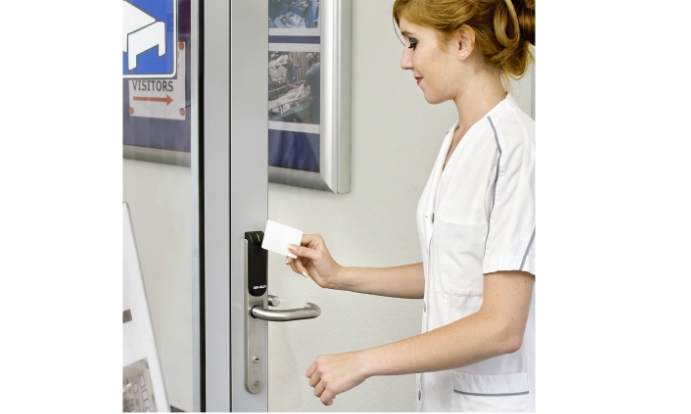A modern hospital demands secure, but flexible, access control, around the clock and 365 days a year. At Ghent’s new Hospital Maria Middelares, ASSA ABLOY—in partnership with Nedap—delivered just that. Instead of old-fashioned mechanical locks and cumbersome keys, the hospital chose Nedap AEOS access control integrated with Aperio® wireless locks to protect staff, patients and their confidential data.
Hospital managers face multiple security issues. Primarily: how to maintain the hospital as an open, welcoming space for the public, while simultaneously ensuring medicines, staff, expensive equipment and sensitive data are safeguarded? Users vary from doctors, nurses, patients and their visitors to a host of temporary and contract workers. Each needs access rights tailored to their diverse needs.
On top of that, right across the health sector—particularly in taxpayer-funded institutions—budgets are tight. Security is paramount, of course. But managers must always keep an eye on costs.
Traditional keys fail to meet a number of the sector’s critical needs. Mechanical locks can’t offer the user-friendliness, real-time monitoring and detailed audit trails that sensitive security and proper investigation of breaches demands.
Fortunately there is a solution: wireless access control.
Maria Middelares was spread over two sites, in Ghent and nearby Gentbrugge. A major infrastructure project was undertaken to replace these with one new complex, in Ghent, where the hospital is a vital part of everyday life in Belgium’s second-largest city. EGM Architects developed the project in cooperation with Belgian partner LLOX, with the first building at the new facility opening in 2014.
Because of its critical role in local healthcare delivery, Maria Middelares must remain reliably in operation, and secure, 24/7. In partnership with Nedap, around 700 doors in the first new hospital building were fitted with battery-powered Aperio® offline locks connected to the Nedap access control system. Staff at Hospital Maria Middelares now have a user-friendly smart card for opening doors and accessing other secure areas. The smart cards use a standard RFID technology, MIFARE®.
“With Aperio® locks and Nedap access control, it’s easy for facilities managers to generate audit trails for rooms holding controlled medicines or valuable hospital equipment,” says Piet van den Bossche, Access Control Leader at ASSA ABLOY Belgium.
“Very important for the success of this project was also the seamless offline integration between the Nedap access control system and Aperio®,” adds van den Bossche.
With this offline integration, access authorizations are saved directly to the RFID smart cards. Doors are all managed using the Nedap access control system. Users receive new or modified access authorizations from a central point.
Aperio® electronic locks deliver dependable security for all kinds of door openings, from security doors to fire doors, without the need for expensive wiring. Locks are powered by regular lithium-ion batteries, which saves on energy consumption and maintenance costs—an important concern when pressure on public healthcare budgets is ever-present.
Because AperioÒlocks are wireless, it’s easy to extend access control to more doors within the same system whenever needed. So, the hospital’s new Aperio® installation provides an access control system that can grow to include new buildings whenever they come on-stream. And because the deployment was 100 percent wireless, treatment rooms, offices and corridors will remain clutter-free and building aesthetics are maintained.
Aperio® offline technology has been fully integrated with the AEOS security management platform from Nedap, and thereby enables the homogeneous administration of all components, people and functions. AEOS manages almost 800 doors, consisting of more than 200 wired and 700 wireless offline doors. And this number will grow in future.
“Applications of the Nedap access control system AEOS can be found everywhere. Besides Aperio® locks on doors, we also manage locks on the Medicart medication trolley from Belintra,” says Peter Rommens, Sales Manager at Nedap Belgium.
A particular advantage of the AEOS platform lies in the fact that it is not based on ID carriers, but on people. The difference is immediately noticeable, for example, if a card is lost. The entire employee record need not be re-entered into the system just because a person’s identification number is missing. “This way AEOS gives the hospital the flexibility they need to keep control of access and the flow of people,” adds Rommens.
ASSA ABLOY and Nedap welcome a new access control standard
The Aperio® offline integration with Nedap supports the OSS Standard Offline, an open “update on card” standard for offline electronic locks. The OSS Standard Offline was recently developed by ASSA ABLOY, Nedap and other industry leaders. It is designed to give confidence to customers faced with a rapidly developing and diverse market for electronic access control products.
To date, each offline access control component manufacturer has developed its own approach to writing and reading smart cards. However, customers installing components that meet the OSS Standard Offline are now guaranteed interoperability. All locks that conform to the OSS Standard Offline—including Aperio® offline cylinders and escutcheons—read the same access rights from a card and interpret them in the same way.
Customers are free to choose the best OSS-compliant offline lock for the job. At Hospital Maria Middelares—and in healthcare environments across Europe—that choice is AperioÒwireless technology from ASSA ABLOY.
For more information please visit www.assaabloy.com or www.nedapsecurity.com



